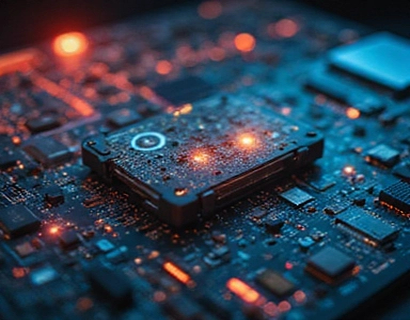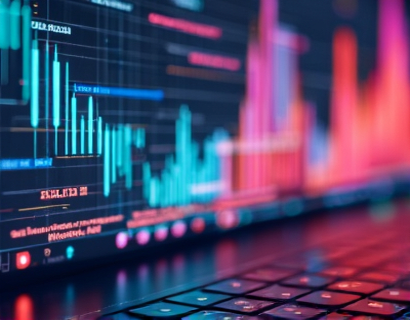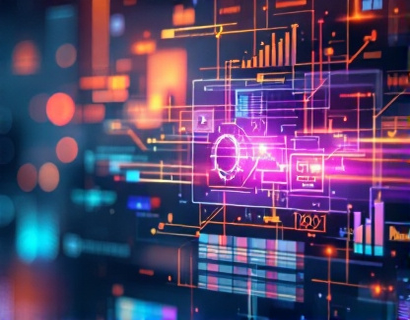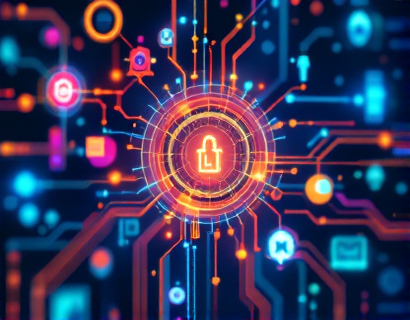The Intersection of AI and Crypto: Revolutionizing Digital Finance
The convergence of artificial intelligence and cryptocurrency is ushering in a new era of digital finance, one that promises unparalleled efficiency, security, and user-centric experiences. This transformative fusion is not just a technological advancement but a paradigm shift in how we perceive and interact with financial systems. As we delve into this topic, it's essential to understand the foundational elements of both AI and crypto, and how their synergy is redefining the landscape of digital finance.
Understanding Artificial Intelligence in Finance
Artificial intelligence, or AI, refers to the simulation of human intelligence processes by machines, particularly computer systems. These processes include learning, reasoning, and self-correction. In the context of finance, AI is leveraged to analyze vast amounts of data, identify patterns, make predictions, and automate complex tasks. The application of AI in finance spans various domains, from algorithmic trading and risk management to customer service and fraud detection.
One of the most significant advantages of AI in finance is its ability to process and analyze big data. Traditional financial systems rely on human analysts to sift through data, which is time-consuming and prone to errors. AI algorithms, on the other hand, can handle massive datasets with speed and accuracy, uncovering insights that would be impossible for humans to detect. This capability is particularly valuable in the crypto space, where market data is vast and constantly evolving.
Cryptocurrency: A Brief Overview
Cryptocurrency, a digital or virtual currency secured by cryptography, operates on a decentralized network known as blockchain. The most well-known cryptocurrency is Bitcoin, but there are thousands of others, each with unique features and use cases. Cryptocurrencies offer several advantages over traditional fiat currencies, including decentralization, transparency, and security. However, their volatility and regulatory uncertainties have also been significant challenges.
The blockchain technology underlying cryptocurrencies is a distributed ledger that records transactions across multiple computers. This decentralized nature ensures that no single entity has control over the entire network, making it resistant to censorship and tampering. The transparency of blockchain, where all transactions are visible to network participants, enhances trust and accountability in financial transactions.
AI in Cryptocurrency: Enhancing Trading and Investment
The integration of AI into cryptocurrency markets is revolutionizing the way traders and investors operate. AI-driven trading algorithms can analyze market data in real-time, identify trends, and execute trades with precision. These algorithms can adapt to changing market conditions, optimizing strategies to maximize returns and minimize risks. For instance, machine learning models can predict price movements based on historical data, technical indicators, and even sentiment analysis from social media and news sources.
Moreover, AI can help in risk management by continuously monitoring portfolios and alerting investors to potential threats. Sentiment analysis tools powered by natural language processing (NLP) can gauge market sentiment by analyzing news articles, social media posts, and other textual data. This information can be crucial for making informed investment decisions.
Automated Trading Bots
Automated trading bots, also known as robots or bots, are AI-powered programs that execute trades based on predefined criteria. These bots can operate 24/7, removing the need for constant human oversight. They can be programmed to follow specific strategies, such as mean-reversion, momentum, or arbitrage, and can adjust their tactics based on market conditions. The use of bots in cryptocurrency trading has democratized access to professional-level trading tools, allowing individual investors to compete with institutional players.
One of the key benefits of AI-driven trading bots is their ability to execute trades at optimal times, capitalizing on market inefficiencies. For example, a bot might identify a undervalued asset based on technical analysis and execute a buy order immediately, a task that would be challenging for a human trader to do consistently and quickly.
AI in Crypto Security
Security is a paramount concern in the crypto world, given the high value of assets and the potential for cyberattacks. AI plays a crucial role in enhancing the security of cryptocurrency transactions and wallets. Machine learning algorithms can detect and prevent fraudulent activities by identifying unusual patterns or behaviors that deviate from the norm. For instance, AI can monitor transaction histories and flag suspicious activities, such as multiple failed login attempts or large, unexplained transfers.
Another critical aspect of crypto security is the protection of private keys, which are essential for accessing and managing digital assets. AI-powered solutions can generate and manage complex, secure private keys, reducing the risk of theft or loss. Additionally, AI can enhance the security of smart contracts by identifying vulnerabilities and ensuring that the code executes as intended.
Decentralized Identity Verification
Decentralized identity verification is an emerging area where AI and blockchain intersect to enhance user security and privacy. Traditional identity verification processes often rely on centralized databases, which are vulnerable to breaches and misuse. AI-driven decentralized identity solutions use blockchain to create secure, self-sovereign identities that users control. These solutions leverage AI to verify identities through biometric data, such as facial recognition or fingerprint scans, without storing sensitive information on a central server.
This approach not only enhances security but also empowers users by giving them full control over their personal data. Users can choose what information to share and with whom, reducing the risk of data breaches and unauthorized access. AI algorithms can continuously update and verify identity credentials, ensuring that the information remains current and secure.
AI in Crypto Finance Services
Beyond trading and security, AI is transforming various aspects of crypto finance services, including lending, insurance, and asset management. AI-driven platforms can offer more personalized and efficient financial services, catering to the unique needs of crypto users.
Decentralized Finance (DeFi)
Decentralized Finance, or DeFi, is a rapidly growing sector that aims to create financial systems without intermediaries, leveraging blockchain technology. AI plays a pivotal role in DeFi by optimizing protocols, enhancing user experiences, and improving risk management. For example, AI can analyze loan applications and assess creditworthiness in real-time, enabling faster and more accurate lending decisions. Smart contracts powered by AI can automate complex financial operations, ensuring that all parties adhere to agreed terms.
AI-driven risk assessment tools can evaluate the volatility and liquidity of crypto assets, helping users make informed decisions about lending and borrowing. These tools can also predict market trends and adjust strategies accordingly, providing a competitive edge in the dynamic DeFi landscape.
Enhancing User Experiences through AI
The user experience in the crypto space is often criticized for being complex and intimidating. AI can significantly improve this by providing intuitive, user-friendly interfaces and personalized support. Chatbots powered by natural language processing can offer 24/7 customer service, answering queries and guiding users through various processes. These chatbots can understand natural language, making interactions more seamless and efficient.
Personalization is another area where AI shines. By analyzing user behavior and preferences, AI can tailor recommendations and services to individual needs. For instance, a crypto wallet app could suggest optimal investment strategies based on a user's risk tolerance and financial goals. AI can also enhance security by adapting to user habits, detecting anomalies, and providing real-time alerts.
Education and Onboarding
Education is crucial for widespread adoption of crypto and AI technologies. AI-powered educational tools can demystify complex concepts and make learning more engaging. Interactive tutorials, virtual assistants, and gamified learning experiences can help newcomers understand the basics of blockchain, cryptocurrencies, and AI. These tools can adapt to the learner's pace and style, ensuring a comprehensive and effective educational journey.
Onboarding new users to crypto platforms can also be streamlined with AI. By analyzing user data, AI can identify common pain points in the onboarding process and suggest improvements. For example, AI can optimize the registration flow, reduce the number of required steps, and provide contextual help, making the process smoother and more user-friendly.
Challenges and Considerations
While the integration of AI and crypto offers numerous benefits, it also presents several challenges that need to be addressed. One of the primary concerns is the regulatory landscape. The crypto space is still largely unregulated, and the introduction of AI adds another layer of complexity. Regulators are grappling with how to oversee AI-driven financial services, ensuring compliance with existing laws and preventing misuse.
Another challenge is the ethical use of AI. Ensuring that AI algorithms are transparent, fair, and unbiased is crucial. There is a risk of AI perpetuating existing biases or making decisions that could harm users. Therefore, it's essential to develop and implement ethical guidelines for AI in finance, with a focus on accountability and transparency.
Data Privacy and Security
Data privacy and security remain top concerns in the crypto and AI intersection. While AI can enhance security, it also requires access to large amounts of data, raising questions about data ownership and usage. It's imperative to implement robust data protection measures, ensuring that user data is handled responsibly and in compliance with privacy regulations such as GDPR.
Moreover, the use of AI in crypto transactions must be secure against advanced cyber threats. As AI systems become more sophisticated, so do the methods of attackers. Continuous monitoring, regular updates, and advanced threat detection mechanisms are essential to safeguard AI-driven financial services.
The Future of AI and Crypto
The future of AI and crypto is bright, with numerous opportunities for innovation and growth. As technology advances, we can expect even more sophisticated applications of AI in the crypto space. One promising area is the development of AI-driven financial advisors, which can provide personalized investment advice based on a comprehensive analysis of market data, user preferences, and financial goals.
Another exciting development is the integration of AI with other emerging technologies, such as quantum computing and the Internet of Things (IoT). Quantum computing can enhance the computational power required for complex AI algorithms, while IoT can provide real-time data feeds for more accurate predictions and decision-making.
Conclusion
The synergy between AI and crypto is transforming digital finance, offering unprecedented opportunities for efficiency, security, and user-centric experiences. As the technology continues to evolve, it's crucial for stakeholders to address the challenges and ensure responsible, ethical use. The future holds immense potential, and those who embrace this fusion will be at the forefront of the next financial revolution.










































